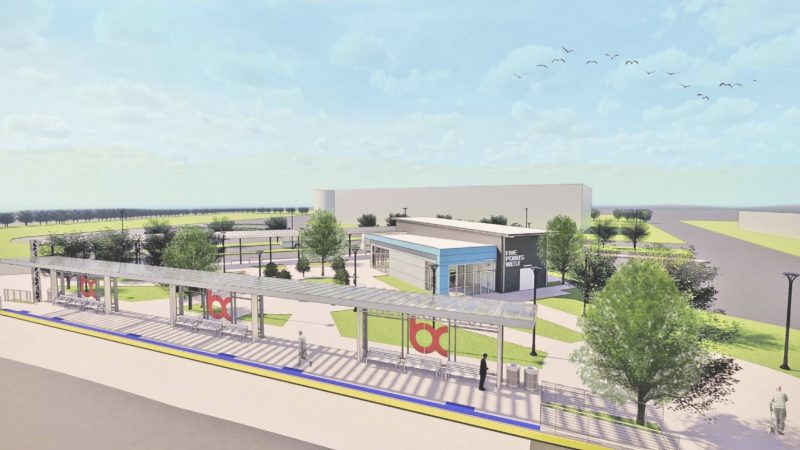Birmingham Council Set To Fund Rapid Transit Project Next Week
The Birmingham City Council is set to allocate $18 million of the city’s American Rescue Plan funding toward the construction of the city’s Bus Rapid Transit system.
The project, which will create a 10-mile, higher-speed public transit corridor through 25 neighborhoods, broke ground in December. But rising construction costs due to the COVID-19 pandemic had placed significant strain on the project, according to Charlotte Shaw, the city’s deputy director of capital projects, at the council meeting on Tuesday.
“This is what’s called ’the perfect storm’ right now for the construction industry,” Shaw said. “Material and supplies and workforce [costs] have escalated tremendously.”
That meant that when the city sent out a request for contractors to bid on the project, the lowest bid it received was still $11 million higher than the $45.8 million budgeted for the project. When the city called for bids a second time, it received none.
Shaw said city planners had worked to lower the project’s costs, cutting significant portions, such as a $1.1 million transit signal priority component, which would streamline traffic signal patterns along the corridor of the bus rapid transit. Even with these reductions and factoring in contingency costs, Shaw said the project would need an additional $14 million in funding to move forward.
But councilors argued that they’d rather not make any cuts to the Bus Rapid Transit program at all.
“I think it’s important that we don’t spend all of this money to create just another bus service,” District 2 Councilor Hunter Williams said. “We need to be really intentional about making sure this is actually a Bus Rapid Transit service … Initially, because of the constraints, Mrs. Shaw took out the $1.1 million for traffic lights, which is the ‘rapid’ part of the BRT. I think it’s important that we keep that in. I think it’d be really foolish to spend almost $60 million and not do the project correctly over $1.1 million … The real backbone of BRT in any city is its ability to be on time, consistent and reliable.”
District 8 Councilor Steven Hoyt went even further, arguing that the council should fund the BRT project “in its entirety.”
“This really says much about who we are as a city and if we do what we say we’re going to do,” Hoyt said. “We need to make sure that we do it and we do it right … I really don’t think we need to take anything out that we’ve had planned for this project … When other projects hit snags, we don’t tell them to scale back. We find the money.”
An obvious source, some councilors suggested, was federal American Rescue Plan funding. The city had its first $74 million tranche of relief money in May; another $74 million will follow next May. Though some of that first half already has been allocated to city employees’ premium pay, there’s roughly $53.1 million still to be spent.
A proposal to allocate $18 million to the BRT program will come before the council for a vote next Tuesday. That money will initially come from the city’s general fund balance, which will be replenished by ARP funding later. Though that last point was the subject of some debate, the council eventually voted unanimously to advance the proposal out of committee.
Last month, the council had balked at Mayor Randall Woodfin’s proposed divvying of the remaining ARP funding into several different “buckets” — including, among other categories, $18.75 million for public transportation. Councilors — particularly Williams and Hoyt — had taken issue with that line item, arguing that there had been no specific explanation from Woodfin’s office on how that transit allocation would be spent.
Now, it appears, they have it.
Mideast clashes breach Olympic truce as athletes gather for Winter Paralympic Games
Fighting intensified in the Middle East during the Olympic truce, in effect through March 15. Flights are being disrupted as athletes and families converge on Italy for the Winter Paralympics.
A U.S. scholarship thrills a teacher in India. Then came the soul-crushing questions
She was thrilled to become the first teacher from a government-sponsored school in India to get a Fulbright exchange award to learn from U.S. schools. People asked two questions that clouded her joy.
Sunday Puzzle: Sandwiched
NPR's Ayesha Rascoe plays the puzzle with WXXI listener Jonathan Black and Weekend Edition Puzzlemaster Will Shortz.
U.S.-Israeli strikes in Iran continue into 2nd day, as the region faces turmoil
Israel said on Sunday it had launched more attacks on Iran, while the Iranian government continued strikes on Israel and on U.S. targets in Gulf states, Iraq and Jordan.
Trump warns Iran not to retaliate after Ayatollah Ali Khamenei is killed
The Iranian government has announced 40 days of mourning. The country's supreme leader was killed following an attack launched by the U.S. and Israel on Saturday against Iran.
Iran fires missiles at Israel and Gulf states after U.S.-Israeli strike kills Khamenei
Iran fired missiles at targets in Israel and Gulf Arab states Sunday after vowing massive retaliation for the killing of Supreme Leader Ayatollah Ali Khamenei by the United States and Israel.








